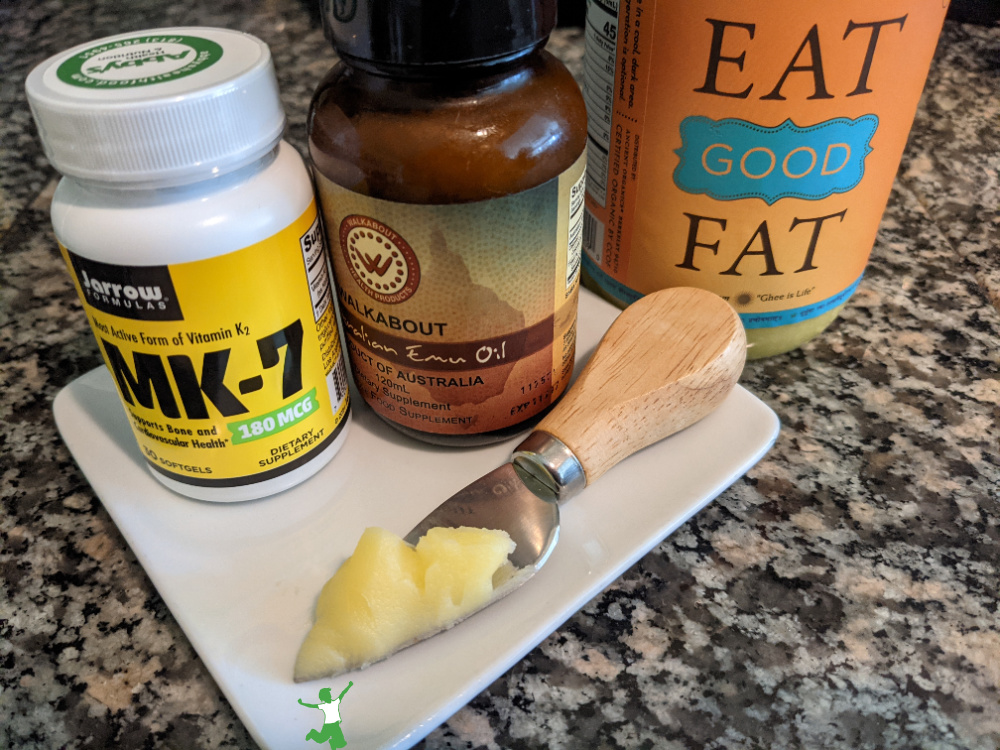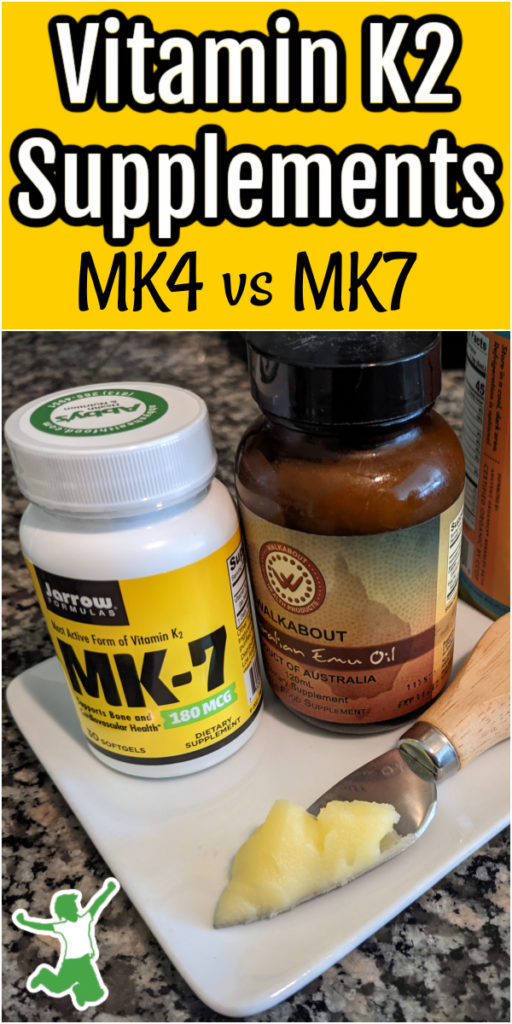Discussion of the various vitamin K2 supplements on the market with a comparison of MK-4 from animal sources or MK-7 from bacterial fermentation to ensure the diet contains sufficient amounts of this elusive yet critical nutrient.

Getting enough Vitamin K2 is absolutely essential to vibrant health. Surprisingly, the vast majority of people are seriously deficient.
Even those eating a completely whole food, organic diet, usually fall short when it comes to getting enough of either of the two major forms: MK-7 and MK-4.
Traditional Societies instinctively put great importance on foods high in Vitamin K2.
These sacred foods were consumed in larger quantities by young couples preparing to conceive.
In addition, pregnant and breastfeeding women, growing children, and the elderly received more to preserve health during these critical times of life.
Sufficient Vitamin K2 along with the other critical fat-soluble activators A and D are especially important for pregnant women to consume to ensure healthy babies.
It is important to note that Vitamin K1 from leafy greens is a different nutrient! It is not the same as Vitamin K2 found in the sacred foods of traditional cultures.
The best food sources of Vitamin K2 are grass-fed dairy products, emu oil, gouda, brie cheese, and natto, a very strong-tasting fermented soy product with roots in Japan.
Vitamin K2 from animal sources is MK-4, while K2 produced by bacterial fermentation as found in natto or cheese is MK-7.
Getting Enough Vitamin K2 in the Diet
Unfortunately, even if one consumes plenty of grass-fed dairy, getting enough K2 in the diet is still a challenge. This is due to the worrisome depletion of our soils which will take generations to repair.
Consider that the spring butter of the traditional Alpine living Swiss was an orange color. Grass-fed spring butter today is at best deep yellow.
No doubt, the soil that produced the rapidly growing spring grass that the Alpine cows grazed upon was much higher in nutrients to produce orange butter which the Swiss reverently placed in bowls with wicks to burn in their Churches.
K2 Is Not Recycled by the Body like K1
One factor contributing to widespread Vitamin K2 deficiency is the apparent lack of recycling of this nutrient by the body.
This is in contrast to Vitamin K1 from leafy green vegetables, which can be reused metabolically.
This means that Vitamin K2 stores can be quickly depleted with invisible deficiency occurring in as little as 7 days.
This is concerning especially if you are taking Vitamin D or calcium supplements. Sufficient K2 is necessary to prevent arterial calcification when the intake of these synergistic nutrients is high.
K2 Supplements Bridge the Dietary Gap
While it is always best to strive to get your nutrients from food, the critical nature of Vitamin K2 and the depletion of our soils indicates to me that supplementation is a good idea.
I did not feel certain that we could get enough K2 by eating reasonable amounts of whole and even sacred foods from grass-fed sources like Traditional Societies would have obtained by eating a similar diet.
Based on population studies and data obtained from Vitamin K2 doses given in clinical trials, it seems that 45 mcg/day would be the minimal dose needed for any sort of therapeutic effect.
Several hundred mcg/day is a better target as this is what frequent natto eaters in Japan consume.
The good news is that Vitamin K2 has no known toxicity. Thus, adding a daily supplement taken with food to improve absorption has no downside.
MK-7 vs MK-4
If you decide that taking a Vitamin K2 supplement makes sense to you, which should you choose?
If given the choice, I prefer MK-4, the animal form of Vitamin K2 over MK-7, the form of K2 from bacterial fermentation.
I get MK-4 in my diet by cooking frequently with pastured ghee, the clarified form of butter. I also eat plenty and a wide variety of cheeses along with pastured butter and eggs.
MK-4 from Food
When it comes to the animal form of Vitamin K2…MK-4…you really must get it from Real Food. The best sources are grass-fed butter, emu oil, ghee, goose liver, cheese, and pastured egg yolks.
I cannot stress enough that these are critical whole foods in your diet.
You cannot rely on a supplement form of MK-4, known as menatetrenone, because it is synthetic.
This is similar to the widespread issue of synthetic vitamin C supplements. Incidentally, folic acid is synthetic too (you want folate).
Synthetic MK-4
The supplement form of MK-4 is commonly extracted from tobacco, most likely of GMO origin (90% of tobacco crops are genetically modified).
It is not the same MK-4 as found in grass-fed butter oil, eggs, goose liver, gouda cheese, or pastured emu oil.
Supplement manufacturers rely on synthetic MK-4 because it would be prohibitively expensive to obtain this nutrient from whole food sources.
MK-4 in the Blood
Another big downside of synthetic MK-4 is the very short time it remains in the body.
For this reason, dosing every few hours is necessary to maintain therapeutic levels in the blood.
This is a very inconvenient aspect of these supplements that is rarely understood by consumers looking for therapeutic benefits.
Natural MK-7 Supplements
While MK-4 supplements are synthetic, MK-7 supplements produced via fermentation are not.
Thus, when it comes to supplementing with Vitamin K2, MK-7 is the safest and most effective form to take.
For example, this brand of Vitamin K2 is derived from nonGMO natto. My family has relied on it for many years.
If you enjoy the unusual flavor of this Japanese traditional food, I recommend natto fried rice as perhaps the best-tasting dish.
For those who are avoiding even fermented forms of soy, this Vitamin K2 from fermented chickpeas is a good brand to consider.
Blood Levels of MK-7
A huge benefit of supplementing with MK-7 is that it stays in therapeutic doses in the blood much longer than synthetic MK-4.
As a result, a once-a-day supplement of MK-7 is sufficient.
This is a very effective addition to the natural MK-4 from a diet high in grass-fed dairy and other sacred foods.
Summary. You Need BOTH MK-4 and MK-7
Getting enough of the natural, fermented form of Vitamin K2 in the diet via quality MK-7 supplements is a great strategy. To this end, I take this brand of Vitamin K2 derived from nonGMO natto.
However, it is critical to ensure you are also getting plenty of the animal form of Vitamin K2…MK-4…via whole foods.
The best MK-4 sources include cheese, pastured butter (especially ghee or raw butter oil), emu oil, goose liver, and pastured egg yolks.
Cheese from the milk of pastured cows is a particularly special source of Vitamin K2 because both MK-4 and MK-7 are in the same food!
Be sure to read labels and avoid MK-4 supplements as they are synthetic. I’ve seen at least one brand that lists menatetrenone as Vitamin K2 and not specifically MK-4, so buyer beware!
When it comes to the amount of Vitamin K2 you might need every day to maintain strong teeth, bones, and plaque-free arteries, I strongly recommend the book Vitamin K2 and the Calcium Paradox by Dr. Kate Rheaume-Bleue BSc, ND.
She discusses the daily dosage needed for healthy people versus those who need to reverse arterial calcification, osteoporosis, and other degenerative issues.

References
(1) Vitamin K2 and the Calcium Paradox by Dr. Kate Rheaume-Bleue BSc, ND
(2) Nutrition and Physical Degeneration, by Dr. Weston A. Price
(3) Menatretnone
More Information
The Latest Scoop on K2 Wonder Nutrient
The Vitamin Deficiency That Shows on Your Face
Nightshade Vegetables and Pain








I myself take Jarrow’s MK-7, but for my father who had two strokes, I was told that Vitamin K2 acts as blood clotting and it’s better to take Doctor’s Best Natookinase because all the vitamin K is removed. Then someone said K1 is blood coagulant but not K2. We need something that would remove the clots in my father’s blood. What do you think about all this? Thank you.
I am so glad I found this site! My son is 5 and has a rather large part of a back molar decayed away; however, there is no complaint of pain from him even during brushing or cleaning it out. We are eliminating processed sugar and as many items with phytic acid as we are aware of. I began giving him Vitamin D3 and Fish Oil supplements, but now that I have found radiant life, I am going to purchase their products (much better quality than what I am using now). Here is my question: If I give him the blue ice fish and butter oil combo and the jarrow formula mk-7, do I need to add vitamin D3 as well? Is this enough to help remineralize his teeth? I have switched to a homemade remineralizing toothpaste as well. Thanks so much for your help!!
Great article, well written and very informative 🙂
Can I give Mk7 to my 3 & 6 year old? To heal cavities with fermented CLO?
Yes you can! If they can swallow small capsules. My three kids all take it.
Hello, I am wanting to give the Mk7 product mentioned above to my 3 & 6 year old along with Fermented CLO as outlined in the above article to heal a cavity. Is it safe to give the MK 7 product to a 3 & 6 year old? It says to consult a physician for children under 18. We eat a clean diet but we cannot do cow milk due to intoletance. Thank you
From what I have been reading, MK-7 helps the heart and arteries, and MK-4 improves bone strength and osteoporosis. They work together to direct calcium TO where it belongs (bones) and AWAY from where it doesn’t belong (heart and arteries). It isn’t an ‘either/or’ situation. Many people are already speaking in absolutes about Vitamin K2, which was only NAMED about 2007, just ten years ago. Anyone who says that everything is known about this vitamin is a liar, and so is anyone who speaks in absolutes. The research has just begun. Big Pharma has the money to do the most research, but they aren’t interested because they can’t patent it and charge you a fortune, because it’s a natural product. The same with iodine, and any other natural-based supplement. So, most research is done by small companies and independents and, of course, other countries. When you want the truth of something, Follow the Money.
It’s true there is confusion about the various forms of K2. Regarding the Japanese study cited above on minimal therapeutic doses of K2, that was based on K2-MK4, thus not related to Japanese natto consumption which contains no K2-MK4. However, there was a 2013 Dutch study that suggested that long term (3+ years) consumption of K2-MK7 was beneficial in reducing bone loss in postmenopausal women. [www.ncbi.nlm.nih.gov/pubmed/23525894]
The problem with MK-4 and MK-7 is that they aren’t the same, and they each affect the body differently. You need to do more research.
MK-7 is redistributed by the liver and transported to the extra-hepatic tissues where deficiency is typically found. Vitamin K2-7 (MK-7) has a half-life of 72 hours when compared to 1.5 hours for Vitamin K1. The absorption of MK-7 is better; it has stable serum levels and accumulates to higher levels during prolonged intake.
The problem with this reaction is that a number of people are sensitive to the MK7 form of vitamin K2, this results in anxiety,. sleeplessness, a thumping heart beat and raised blood pressure. Since MK4 vitamin K2 is native to the human body, it never has this kind of side effects and the side effects observed in the Japan safety trials of MK4 noted only mild side effects. The 10% to 20% of people who are sensitive really can’t take the MK7 form.